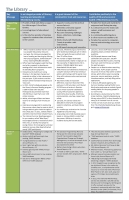Charlotte Mecklenburg Library Communications Plan
Charlotte Mecklenburg Library, N.C.
Innovation Synopsis
Coming out of a budget crisis where funding for the Charlotte Mecklenburg Library was described as “discretionary,” the Library implemented a communications plan that positioned the Library as an educational resource. As a result, 99% of survey respondents agreed that the Library was a valuable educational resource in the community.
Challenge/Opportunity
The Great Recession presented the Charlotte Mecklenburg Library with unprecedented financial challenges. The Library’s Fiscal Year 2011 operating budget was reduced by nearly half, with the Mecklenburg Board of County Commissioners citing Library funding as “discretionary” and not one of its top three priorities. With limited abilities to raise funds in other ways, Fiscal Year 2011 saw layoffs, library closures and reduced hours. When the library closures and reduced hours were announced, community supporters became vocal and news media coverage of the crisis grew in intensity. The Board of Trustees, Functional Consolidation Steering Committee, Future of the Library Task Force, and Library staff worked diligently in FY11 to manage the budget so that the Library could maintain the best service and resources possible and communicate accurate and timely information to the public and Library stakeholders. These groups simultaneously developed strategies for future operations, programming, fundraising and communications. Fiscal Years 2012 and 2013 saw additional $2.8 million in public funding to expand hours and services. This positioned the Library well, but required continued focus on areas of importance to the community and our funders. One of those areas, valued by public and private funders alike, was the Library’s role in educational support.
Key Elements of Innovation
Critical to the success of the communications plan was the creation and adherence to key messages that emphasized the Library’s role in educational support. Library Marketing & Communications went through a 4-step process to develop these key messages, partly gleaned from a PRSA webinar on the subject. 1. Identify your messaging needs: “Evergreen” information or project-specific. 2. Determine if one size fits all. 3. Prepare 3 key messages. Describe an organization, product, service, program or point of view; Differentiate it and showcase strategic leadership; and focus on benefits delivered to target audiences. 4. Prove your points (this is where we use our statistics, our lists of services, and our stories of impact). As a result of this exercise, we developed three over-arching key messages, plus several supporting messages. We then backed those up with statistics and stories of impact that speak to the head and the heart. Finally, we created a “key messages 1-pager” that could be printed on ledger paper and constantly referred to. This meant no more creating messaging on the fly, no more digging for statistics and no more searching for great stories. All that was left was to customize the messaging and supporting information to the audience. This revolutionized not only how Marketing & Communications did our jobs, but many other departments as well – such as Development, Library Experiences and others.
Achieved Outcomes
At the beginning of the year, we created a measurable outcome to see if we were successful in positioning ourselves as an educational resource. We said we would provide community awareness of the value and benefit of the Library’s educational services, programs and collections, as measured by the percentage of community respondents who agreed or strongly agreed to the statement “The Public Library is a valuable educational resource.” In a survey. Our target, based on a similar survey in 2011, was 97%. The actual results in 2013 were 99%. But we have also seen anecdotally a shift in perceptions of the Library. For example, we are often included in conversations about public schools and higher education.

